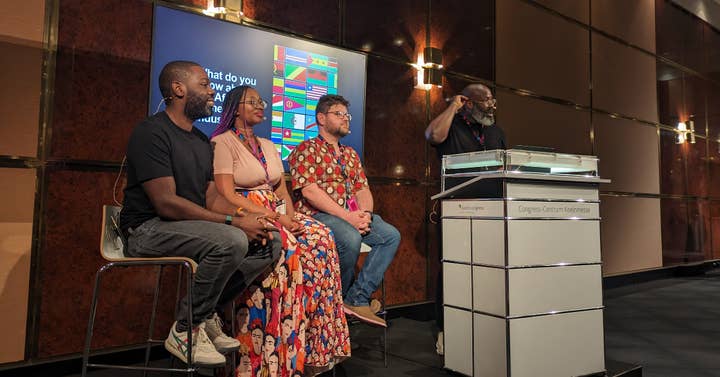Industry needs to break down biases about African games markets
Devcom panel calls for more support and visibility for continent that makes up one third of global population
At Devcom yesterday, a panel of experts from across the African games industry called for the wider business to address the biases and misconceptions they have about the continent's games markets.
The talk was hosted by Games Industry Africa co-founder and Starbreeze VP of business development Vic Bassey, and featured Africa Games Week co-founder and RenderHeads CEO Nick Hall, RocketRide business development manager and IGDA board member Limpho Moeti, and Maliyo Games founder Hugo Obi.
Reacting to a question from the audience, the panel advocated for the games industry at large to educate itself on Africa's markets. The topic came up after an audience member said in earnest that they were not really aware that there was a games industry in Africa, or people interested in games, touching upon the visibility issues impacting the continent. They further asked how devs from Europe can help change that image.
"If you contract and work with African providers, don't just assume that they're going to be significantly cheaper and you can exploit them"
"One of the best things I think you can do is look at your own biases and perceptions," Hall said. "Why did you think that an entire continent is not participating in the space? It's literally a third of the world's population. This bugs me, whenever there's this big game launch, they've got this big world map, and Africa is never in there. Never.
"And there's this assumption of, well, of course not. Because what is Africa? Africa is poverty, Africa is wild animals, Africa is war zones. And that is not what Africa is about. And if you did even a modicum of research, you would see that that's not the case. So the spiteful answer is: be better," he laughed.
"But practically though, there is a visibility issue, and the thing you can do with your limited support is, if there are African games, find out about them, promote them and support them. If you contract and work with African providers, don't just assume that because they're in Africa they're going to be significantly cheaper and you can exploit them, because that is not the case either. Treat them as human beings and as respectable business partners."
Moeti agreed with Hall, adding that it's always tough discussing visibility because "there's only so much that can be done."
"Have African developers in events that you're organising, in your spaces," she said. "That's a conscious effort to also seek out the information. It's not easily visible but it's not difficult to find either."
Hall continued, pointing to the systemic issues also at play, which further complicate the challenges facing the African industries.
"It's incredibly difficult for Africans to get to these events. Which is why you probably didn't know about it. These are issues that are a huge problem. Travel costs are a significant problem."
"Whenever there's this big game launch, they've got [a] world map, and Africa is never in there... Because what is Africa? Africa is poverty, Africa is wild animals, Africa is war zones. And that is not what Africa is about"
Obi acknowledged that his view was "slightly different," explaining: "I think being on podiums like this helps to communicate what we're doing. Having people like us on stage helps to share. I don't think you're alone. I went to the BIG indie games festival this year and before then I knew nothing about the Brazilian games industry. I had to read up on it and then I was really impressed and then I went, then I was even more impressed!
"So having an event like Africa Games Week also helps, having more people come to these types of events and meet the developers and be impressed with the growth and improvement that they've made with the products that they're building. That's a starting point. I think there are things being done already but, again, being on stage, having these opportunities to share and then the conversations that happen afterwards, the knowledge that you now have, that you can then take home with you [helps]."
Moeti added that follow ups are really important, with both her and Hall emphasising that panels like this keep happening but there's more to build from that starting point.
"These conversations are awesome and it's always exciting and it generates excitement, but then in a few years, we're having the same talk again," Moeti said. "We want to keep the momentum going forward because there's a lot of amazing things that happen on the continent. In 2018 there was the first game from an African studio on a Nintendo console. So it's about celebrating those wins. And I do think that breaking down those biases to a degree is vital because it's difficult to be taken seriously if there's still a level of 'Oh, it's in crisis'. Yes, there are crises, but [we're not just that].
"We're also experts, we're also making incredible stuff and it's good to be able to have those discussions as peers. And understanding the specificities of the industries as well, in Nigeria, Ghana, South Africa, Kenya, and really engaging with these developers consciously as potential collaborators in the way you would with other companies around."
Keep an eye out for our full write up about insights on the markets of the African continent in the coming weeks.
GamesIndustry.biz is a media partner for Devcom 2023.

